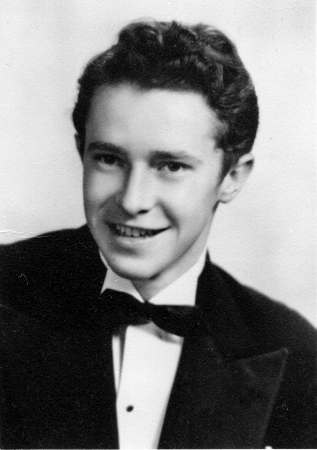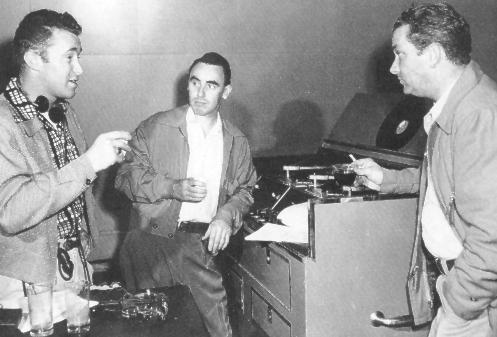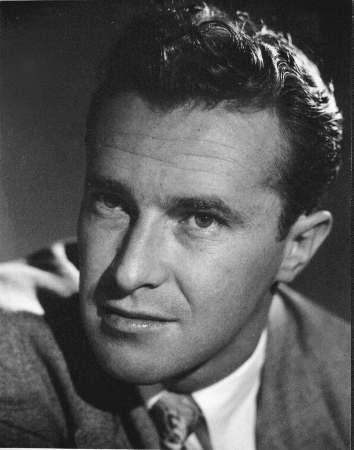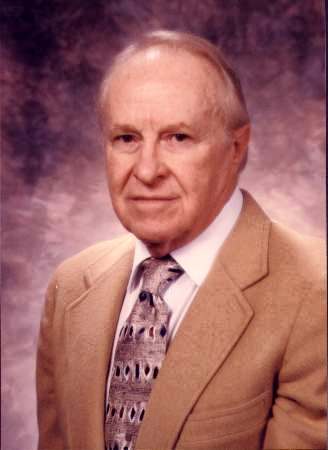 Ray came from a modest, middle-class family with an older
brother who had volunteered for military service in 1938 and who was already
overseas doing combat duty. A friend of the family who worked in radio
knew Celeste Rush, the wife of Lou Merrill, a very busy, very good radio
actor in Hollywood for many years. Celeste, a handsome woman with raven
black hair, had at one time done some radio acting herself. Currently,
however, she conducted the Celeste Rush School of Radio Acting. The family
friend contacted Celeste on behalf of the eager teenager, and Celeste invited
Ray Kemper for an interview. This resulted not only in his acceptance but
carried a scholarship so that Ray's tuition would be only $10 a month,
a fraction of the usual rate. Ray explained that his parents were "anything
but wealthy," so his after-school job at a grocery store paid the
modest fee. He remembers his radio acting school days vividly:
Ray came from a modest, middle-class family with an older
brother who had volunteered for military service in 1938 and who was already
overseas doing combat duty. A friend of the family who worked in radio
knew Celeste Rush, the wife of Lou Merrill, a very busy, very good radio
actor in Hollywood for many years. Celeste, a handsome woman with raven
black hair, had at one time done some radio acting herself. Currently,
however, she conducted the Celeste Rush School of Radio Acting. The family
friend contacted Celeste on behalf of the eager teenager, and Celeste invited
Ray Kemper for an interview. This resulted not only in his acceptance but
carried a scholarship so that Ray's tuition would be only $10 a month,
a fraction of the usual rate. Ray explained that his parents were "anything
but wealthy," so his after-school job at a grocery store paid the
modest fee. He remembers his radio acting school days vividly:
"There were only about eight students in the class which met once a week on Saturday morning. Celeste herself was the teacher and I believe a good one. She also held classes for other students during the week, but, of course, I couldn't attend any of those because of school. She had some kind of arrangement with local radio station KFWB to air a production of her choice each week. We, her students, were the actors, sound effects men or women and anything else that needed doing to get the show on the air. It was always done live. That was great experience for all of us. I had a big advantage in the choice of parts because I was the only male in the class. Celeste always directed the production."
Perhaps it should be noted that such local productions on radio by groups within the community were not totally motivated by the radio station's altruism. The FCC required evidence of community service broadcasts for license renewals, and such productions by educational and civic organizations didn't cost the station a dime! The time slot was usually one that wasn't attractive to commercial sponsors.
Sound Effects at Don Lee/Mutual
 Ray Kemper, Tom Hanley and Norm McDonnel
Ray Kemper, Tom Hanley and Norm McDonnel
In his book The Great American Broadcast Leonard Maltin quotes from the Gassman brothers' tape Ray's accounts of how sound effects can misfire, how he and Tom Hanley achieved more realistic gunshots for the later CBS radio classic Gunsmoke, and other highlights. Kemper is quoted as saying, "You used different psychology with different directors."
 One year later in 1948 an "executive"
(who shall be nameless) lured Ray Kemper away from radio to a position
as writer/director for a major ad agency in Hollywood. He soon found that
the main criterion for a good ad man was to be a first class "huckster."
After suffering in that job for two years Ray resigned and returned to
what he perceived to be his "first love" -- acting. He did a
few radio shows and appeared in one movie, Navy Bound with Tom Neal.
However, Ray explained that because he and his family had become accustomed
to eating regularly he accepted a position in the CBS Radio (Hollywood)
sound effects department when it became available in March, 1951, and for
the next seven years did sound effects with such programs as The Jack
Benny Show, Gunsmoke, Suspense, Escape, Fort
Laramie, Have Gun, Will Travel, The Whistler, Romance,
Amos 'n Andy and many others. During this period he continued his
writing career, selling scripts to Gunsmoke and Have Gun, Will
Travel.
One year later in 1948 an "executive"
(who shall be nameless) lured Ray Kemper away from radio to a position
as writer/director for a major ad agency in Hollywood. He soon found that
the main criterion for a good ad man was to be a first class "huckster."
After suffering in that job for two years Ray resigned and returned to
what he perceived to be his "first love" -- acting. He did a
few radio shows and appeared in one movie, Navy Bound with Tom Neal.
However, Ray explained that because he and his family had become accustomed
to eating regularly he accepted a position in the CBS Radio (Hollywood)
sound effects department when it became available in March, 1951, and for
the next seven years did sound effects with such programs as The Jack
Benny Show, Gunsmoke, Suspense, Escape, Fort
Laramie, Have Gun, Will Travel, The Whistler, Romance,
Amos 'n Andy and many others. During this period he continued his
writing career, selling scripts to Gunsmoke and Have Gun, Will
Travel.
